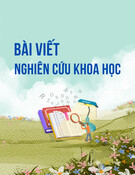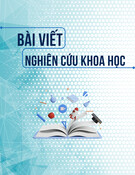
Poetry as method in the History classroom: Decolonising possibilities, pp. 1-28
1
Yesterday&Today, No. 21, July 2019
Poetry as method in the History
classroom: Decolonising possibilities
DOI: http://dx.doi.org/10.17159/2223-0386/2019/n21a1
Sarah Godsell
University of the Witwatersrand
Sarah.godsell@wits.ac.za
Abstract
Poetry can present historical material in a non-academic format. This
format may be particularly important for students who are excluded from
epistemic access (Morrow, 2007). This exclusion stems from many things,
but ways of writing, ways of framing history, and whose voices and stories
are heard are part of this exclusion. This article explores using poetry as
a method of decolonising history teaching, primarily in teacher training
classroom contexts. Poetry provides a unique combination of orality,
personal perspective, artistic license, and historical storytelling. The
form can also draw students into a lesson. As a device somewhat removed
from students’ ideas about what history is, poetry is an alternative way
of investigating ideas of “truth”, evidence, narrative, and perspective.
It provides an entry point to historical topics, that can be supplemented
through other texts and forms of evidence. Poetry also provides a voicing
for sensitive topics, acknowledges and embraces complexity and pain.
It could also remove the teacher as mediator, even if only for a moment.
Additionally, it can open space for marginalised voices and stories. By
drawing from local poems, especially by black womxn poets, race and
gender are centred in the conversation in a visceral way. International
poets open conversations about globally linked histories. Poets from
different generations raise questions of continuity and change. All poems
are open to examination through historical thinking skills. This article
explores the tensions in decolonising the Curriculum Assessment Policy
Statement (CAPS) history Further Education and Training (FET)(Senior
High School) curriculum and in using a creative medium such as poetry
to do so.
Keywords: Decolonisation; History; Teacher education; South Africa;
Curriculum; Poetry; Pedagogy; Historical thinking.
Introduction
In my experience as a lecturer teaching pre-service history teachers in
South Africa, there is one question that I have never been able to answer
satisfactorily: “History hurts. How can we teach it without causing (or
feeling) pain?” This question has been asked of me in multiple ways:

S Godsell
2
Yesterday&Today, No. 21, July 2019
how not to upset students in the classroom; how not to cause hate; how
not let the students leave a classroom feeling unsettled; how not to let
the teacher’s own feelings dominate or be triggered. This same question,
“History hurts”, has been dealt with in different ways in literature on history
education: some advocate an honesty about present day dynamics (Teeger,
2015) or triangulation of evidence, to try to shift students from their
current positions and positionalities to experience and understand different
world views (Wineburg, 2001); others advocate historical perspectives
specifically to be aware of historical wrongs that have been covered up by
distorted or false historical narratives (Dunbar-Ortiz, 2015; Ortiz, 2018;
Zinn, 2005). The latter is arguably most imperative for decolonisation
(when this involves shifting from a colonial lens and unwriting colonial
narratives). This is also most painful, most uncomfortable, and most
taxing. Telling honest histories1 about the past and present realities of
settler-colonial imperialism is painful. How do we teach these histories?
How do we equip pre-service teachers to teach history that hurts? How
do we do this within a programme of decolonising history content and
pedagogy to better teach our students and reflect who they are? This paper
explores poetry as a method to decolonise history teaching. I discuss
theoretical aspects of using poetry in the classroom, and then illustrate
these with examples of poems.2 I will first outline the understanding of
decolonisation underpinning this paper and then explore the use of poems
in the history classroom.
History is an emotionally and politically charged subject, as it is taught
and as it is thought about. Education is a similarly charged subject. When
we focus on history in schools, we need to be aware of the multiple emotive,
pedagogical, and political aspects of history education. By using this as
a nexus of how we can explore decolonising and Africanising curricula,
we can deal with the legacy of colonial education, how history is being
thought of as a possible compulsory subject,3 and the implications this
would have for history teaching.
1 I am using the phrase “honest histories” here, which is also a contestable phrase. What I mean by this is
histories that are evidence based, that are decolonised in that the people writing them are continuously
working to undo the colonial lens, who are actively part of re-visioning and uncovering marginalised
narratives (that were marginalised because previous histories served specific interests). I use honest rather
than as an attempt towards a descriptor that is more specific than decolonised, and not as constrained as
ideas such as “triangulated”. Rather, as Freire suggests, an “honest” history as one that keeps objectivity
and subjectivity in constant dialectical conversation.
2 The poems used in this article are available on www.poetry4historyeducation.com.
3 There is currently a Ministerial Task Team examining the CAPS curriculum, and the possibility that history
may be made into a compulsory subject.

Poetry as method in the History classroom: Decolonising possibilities, pp. 1-28
3
Yesterday&Today, No. 21, July 2019
Poetry can be used to bolster the skills that are outlined at the beginning of
the CAPS history documents (DoBE, 2011; DoBE, 2011a, 2011b). These
skills are not referred to in many of the specific content topics. Poetry can
bridge between skills and content, engaging learners into critical thought,
writing and historical thinking skills.4 This will be examined further below.
This paper engages with some of these questions, utilising specific points
on the decolonisation of the curriculum, to help think through various
materials we use to teach historical thinking. I also examine the knowledge
position they create and then explore the idea of using poetry to counter
some of the positionality that western literature on “what is history” or
“historical thinking” ends up engendering. I explore what this means for
students in a Bachelor of Education course who will be at the coal face of
history teaching in the school classroom.
A note on positionality in a paper engaging the concept of decolonisation:
I am negotiating my space as a white woman lecturer in an academy that is
pushing for transformation. I negotiate this positionality in lecture prep, in
classes, in thinking around the discussions we have, and in trying to hold
space. White people doing work on decolonisation is complex, and perhaps
unavoidably problematic. It is an issue I need to consistently grapple with
in this research project. My approach is to make the classroom a negotiated
space, with as much discussion lead by the students as possible. I also use
my positionality and students’ reaction to it to introduce how their own
positionalities will impact the classroom. It is an interesting discussion on
power dynamics – the various negotiations we have had to allow comfort
for discussions about race in class; how that comfort does not translate into
a comfort with discussions of gender, class or sexuality; which issues get
subsumed into which. These are questions for the larger research project.
For this paper, I want to note that my positionality as a white South African
woman will have an impact on all I do in class, and what I can do in this
paper. I take this into consideration to the best of my ability.
Methodological overview: A high education classroom case study
using participant ethnography
I conducted this study, approved by the Wits Ethics Committee (protocol
number H18/10/10), in my Social Science Senior Primary Method 1 and in
Third Year Methodology classes in 2018. Full informed consent was given
4 The CAPS document will be addressed more thoroughly below. However, an in-depth exploration of the
potential of poetry use in a CAPS lesson is beyond the scope of this paper, and part of forthcoming research.

S Godsell
4
Yesterday&Today, No. 21, July 2019
to use class discussion and assignments anonymously, unless the student
specifically requested their name to be used. The students named in this
paper have requested acknowledgment for their poems or ideas. This is
according to my ethical clearance. Most work was done in the Third Year
Class. There were 47 students in this class, all pre-service teachers in their
third or fourth year of study. These students had chosen history as either
their major or sub-major, so were committed to thinking through issues
around how history should be taught, and were interested in, and conflicted
by, ideas around decolonisation.5 I did not conduct any interviews, and drew
all data referring to this class from our classes in 2018. We used poetry and
discussed decolonisation in this class. This case study is used to support
some of the arguments made. I also engage literature on decolonisation,
history teaching, and poetry as pedagogy. Methodology is interwoven in
all the sections below. The above has given a brief description for clarity
purposes.
Decolonisation: On coloniality and/in history, poetry and/in history
Decolonisation, an exciting impetus for praxis in South African
Universities in 2015,6 has now been used so broadly that it needs a
careful definition for it to do any work. I draw from Lugones’ thinking
on coloniality as the gendered construct of human vs non-human, being
versus non-being (Lugones, 2010).7 In this paper, I use it to think towards
the constitution of the bodies of knowledge we use in relation to the bodies
that inhabit our classrooms, pushing into a changing of intellectual canon;
the relationship of students, learners, lecturers and authors to knowledge;
attitudes towards construction of space-times, as Lewis Gordon proposes
“shifting the geography of reason” (Gordon, 2011). In history, it raises the
recurring questions “whose histories, whose voices, whose writing, whose
knowledge” (Bam et al., 2018, Introduction). Bam references Cabral’s call
for a “return to the source of indigenous cultural resistance in examining
the question of educational transformation” (Bam et al., 2018:17).
Poetry has always been part of this resistance, captured in text from early
20th century by Nontsizi Mgqwetho and SEK Mqhayi (among others) to
present day poetry representing issues of racialised, gendered, and sexual
5 While student perceptions of decolonisation are discussed in this paper, these perceptions are explored
more fully in a forthcoming paper.
6 I am referring here to the #FeesMustFall student movement, a movement for free quality decolonised
education and insourcing of workers. For more on this see: (Booysen, 2016; Ngcaweni & Ngcaweni, 2018).
7 It is beyond the scope of this paper to fully explore Lugones’ movement towards a decolonial feminism, but
I will draw on this thinking in different ways in the paper.

Poetry as method in the History classroom: Decolonising possibilities, pp. 1-28
5
Yesterday&Today, No. 21, July 2019
orientation based oppression (Dominguez, 2012; Mgqwetho, 2007;
Mqhayi, 2017). Scholarly work on decolonisation of history, aspects of
which are addressed in the recently released book by Bam et al., Whose
History Counts, has developed a substantial but fragmented body of
work. Bam et al. focus on exploding the idea of “pre-colonial”, as well as
addressing gaps in the current historiography, through both language and
indigenous knowledge systems. The chapters by Mkhize and Tisani are
most relevant for this article: Mkhize looks both at African(s) self-framing
in historiography and the missing, scattered narratives of black writers.
Reframing and defragmenting African history by African writers, whether
by retrieving these writings from archives or by applying frameworks of
indigenous knowledge practices are discussed by both Mkhize and Tisani
as healing.8 In this article I looking a concept of epistemological healing,
directly addressing narratives of historical wounds. This is relevant for
poetry in the classroom, as a current means of reclaiming and presenting
knowledge, while re-imagining frameworks. 9
Looking particularly at the South African academy, the word
“decolonisation”, if defined, remains useful, as does the literature from
which it emerges, even as it is appropriated by a variety of sectors. I approach
the idea of decolonisation from a broad dual position of Africanisation and
feminist decoloniality. Drawing from decolonial history scholars’ NLL
Ramoupi and RN Ntongwe’s perspective on Africanising the curriculum
(using South Africa and Cameroonian education systems as case studies),
and the role of decolonisation,10 they contend that what is overlooked in:
... pre-colonial African education systems is educational relevance:
its close link with social life, both in a material and spiritual sense; its
many sided-nesses: and its progressive development in conforming to
the successive stages of physical, emotional and mental development of
children. In other words, education in African societies had been socially,
economically and politically relevant to the society (Ramoupi & Ntongwe,
2017: 195).
8 Healing is only one aspect of what these chapters raise, and speak to epistemological healing as part of
decolonial history.
9 While this book is engaged in this paper, it is beyond the scope of this paper to fully appreciate what it
means for pedagogical praxis in history classrooms. I engage the arguments in this book on both writings
and values drawn from this book, to strengthen my argument for poetry as historical pedagogy, but a critical
aspect of it is decolonising historical timeframes currently used in historiography and in CAPS. To explore
using poetry in this is another paper.
10 The work of and impetus for is also laid out in the report of the Ministerial Task Team that investigated
making history into a compulsory subject (Ndlovu et al., 2018). I would argue more strongly for the
decolonisation of the CAPS curriculum, which would entail, but I believe be broader than, its Africanisation.

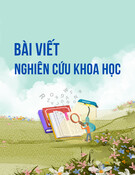
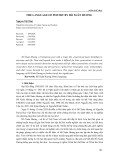

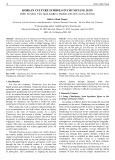

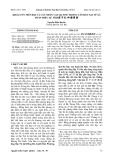
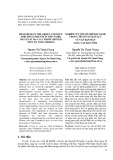
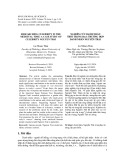
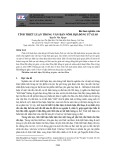
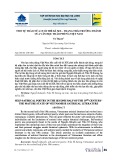
![Bộ câu hỏi trắc nghiệm Văn bản tiếng Việt [chuẩn nhất]](https://cdn.tailieu.vn/images/document/thumbnail/2025/20251127/thuynhung051106@gmail.com/135x160/24021764296609.jpg)
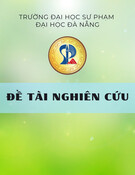

![Bài giảng Ngôn ngữ học đối chiếu Nguyễn Ngọc Chinh [PDF]](https://cdn.tailieu.vn/images/document/thumbnail/2025/20251101/vovu03/135x160/7471762139652.jpg)

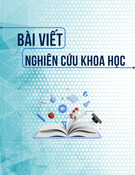
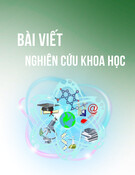
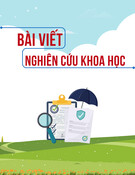
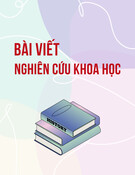
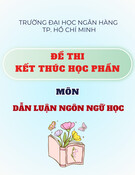
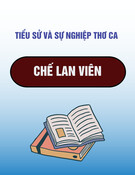
![Ngân hàng câu hỏi môn Tiếng Việt thực hành [chuẩn nhất]](https://cdn.tailieu.vn/images/document/thumbnail/2025/20251003/kimphuong1001/135x160/21861759464951.jpg)
![Bài giảng Văn học phương Tây và Mỹ Latinh [Tập hợp]](https://cdn.tailieu.vn/images/document/thumbnail/2025/20251003/kimphuong1001/135x160/31341759476045.jpg)
